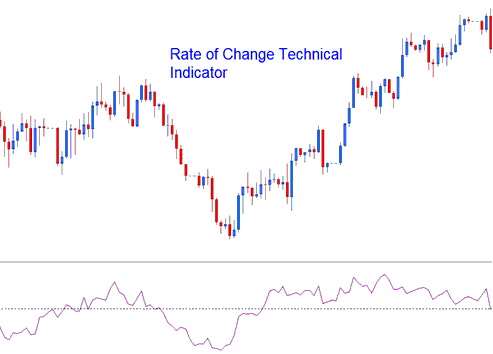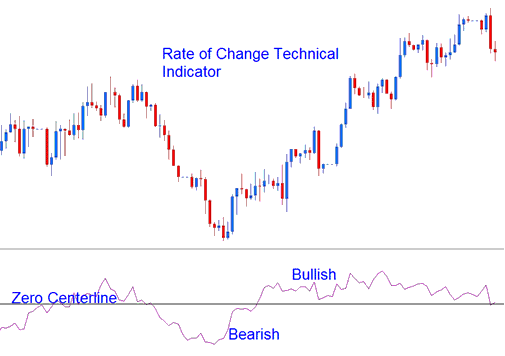Rate of Change Oil Technical Analysis and Rate of Change Trading Signals
Rate of Change indicator is used to calculate how much crude oil price has changed within a specified number of crude oil price periods. It calculates the difference between the current candlestick and the crude oil price of a chosen number of previous candles.
The difference can be calculated using Points or Percents. Rate of Change moves in an oscillation manner, where it oscillates above & below a zero center-line level. Levels above zero are bullish while those below zero center-line level are bearish.
The greater the changes are in the crude oil prices the greater the changes in the ROC.

Crude Oil Technical Analysis & Generating Trading Signals
Rate of Change indicator can be used to generate crude oil signals using a number of methods, the most common ones are:
Crude Trading Crossover Trading Signals
Bullish Signal - buy oil signal is generated when the ROC crosses above the zero center line
Bearish Signal - sell oil signal is generated when the Rate of Change crosses below the zero center line.

Oversold/Overbought Levels:
Overbought - The higher the reading the more overbought a oil is. Values that are above the overbought level imply that a crude oil price is overbought and there is a pending crude oil price correction
Oversold - The lower the reading the more oversold a oil is. Values below the oversold level imply that a oil is oversold and there is a pending crude oil price rally.
However, during strong trending markets the crude oil price will remain in the Oversold/Overbought Levels for a long time, and rather than the crude oil price reversing the crude oil price oil trend will continue for quite some time. It is therefore best to use the crossover signals as the official buy & sell oil signals.
Oil Trend Line Breaks
Oil Trend lines can be drawn on ROC indicator just the same way oil trend lines can be drawn on crude oil price charts. Because The Rate of Change is a leading indicator, the oil trend lines on the indicator will be broken before those on the crude oil price charts. A oil trend-line break on the Rate of Change is an indication of a bullish or bearish reversal oil signal.
- Bearish reversal- Rate of Change readings breaking above a downwards oil trendline warns of a likely bullish reversal.
- Bearish reversal- Rate of Change readings breaking below an upward oil trendline warns of a likely bearish reversal.
Divergence Crude Oil
Rate of Change can be used to trade divergences, and to identify potential oil trend reversal oil signals. There are four types of divergences: classic bullish, classic bearish, hidden bullish and hidden bearish divergence.



